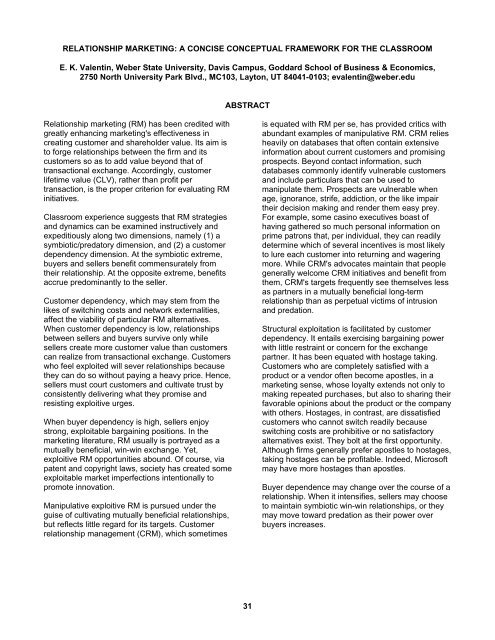2008 - Marketing Educators' Association
2008 - Marketing Educators' Association
2008 - Marketing Educators' Association
Create successful ePaper yourself
Turn your PDF publications into a flip-book with our unique Google optimized e-Paper software.
RELATIONSHIP MARKETING: A CONCISE CONCEPTUAL FRAMEWORK FOR THE CLASSROOM<br />
E. K. Valentin, Weber State University, Davis Campus, Goddard School of Business & Economics,<br />
2750 North University Park Blvd., MC103, Layton, UT 84041-0103; evalentin@weber.edu<br />
Relationship marketing (RM) has been credited with<br />
greatly enhancing marketing's effectiveness in<br />
creating customer and shareholder value. Its aim is<br />
to forge relationships between the firm and its<br />
customers so as to add value beyond that of<br />
transactional exchange. Accordingly, customer<br />
lifetime value (CLV), rather than profit per<br />
transaction, is the proper criterion for evaluating RM<br />
initiatives.<br />
Classroom experience suggests that RM strategies<br />
and dynamics can be examined instructively and<br />
expeditiously along two dimensions, namely (1) a<br />
symbiotic/predatory dimension, and (2) a customer<br />
dependency dimension. At the symbiotic extreme,<br />
buyers and sellers benefit commensurately from<br />
their relationship. At the opposite extreme, benefits<br />
accrue predominantly to the seller.<br />
Customer dependency, which may stem from the<br />
likes of switching costs and network externalities,<br />
affect the viability of particular RM alternatives.<br />
When customer dependency is low, relationships<br />
between sellers and buyers survive only while<br />
sellers create more customer value than customers<br />
can realize from transactional exchange. Customers<br />
who feel exploited will sever relationships because<br />
they can do so without paying a heavy price. Hence,<br />
sellers must court customers and cultivate trust by<br />
consistently delivering what they promise and<br />
resisting exploitive urges.<br />
When buyer dependency is high, sellers enjoy<br />
strong, exploitable bargaining positions. In the<br />
marketing literature, RM usually is portrayed as a<br />
mutually beneficial, win-win exchange. Yet,<br />
exploitive RM opportunities abound. Of course, via<br />
patent and copyright laws, society has created some<br />
exploitable market imperfections intentionally to<br />
promote innovation.<br />
Manipulative exploitive RM is pursued under the<br />
guise of cultivating mutually beneficial relationships,<br />
but reflects little regard for its targets. Customer<br />
relationship management (CRM), which sometimes<br />
ABSTRACT<br />
31<br />
is equated with RM per se, has provided critics with<br />
abundant examples of manipulative RM. CRM relies<br />
heavily on databases that often contain extensive<br />
information about current customers and promising<br />
prospects. Beyond contact information, such<br />
databases commonly identify vulnerable customers<br />
and include particulars that can be used to<br />
manipulate them. Prospects are vulnerable when<br />
age, ignorance, strife, addiction, or the like impair<br />
their decision making and render them easy prey.<br />
For example, some casino executives boast of<br />
having gathered so much personal information on<br />
prime patrons that, per individual, they can readily<br />
determine which of several incentives is most likely<br />
to lure each customer into returning and wagering<br />
more. While CRM's advocates maintain that people<br />
generally welcome CRM initiatives and benefit from<br />
them, CRM's targets frequently see themselves less<br />
as partners in a mutually beneficial long-term<br />
relationship than as perpetual victims of intrusion<br />
and predation.<br />
Structural exploitation is facilitated by customer<br />
dependency. It entails exercising bargaining power<br />
with little restraint or concern for the exchange<br />
partner. It has been equated with hostage taking.<br />
Customers who are completely satisfied with a<br />
product or a vendor often become apostles, in a<br />
marketing sense, whose loyalty extends not only to<br />
making repeated purchases, but also to sharing their<br />
favorable opinions about the product or the company<br />
with others. Hostages, in contrast, are dissatisfied<br />
customers who cannot switch readily because<br />
switching costs are prohibitive or no satisfactory<br />
alternatives exist. They bolt at the first opportunity.<br />
Although firms generally prefer apostles to hostages,<br />
taking hostages can be profitable. Indeed, Microsoft<br />
may have more hostages than apostles.<br />
Buyer dependence may change over the course of a<br />
relationship. When it intensifies, sellers may choose<br />
to maintain symbiotic win-win relationships, or they<br />
may move toward predation as their power over<br />
buyers increases.


